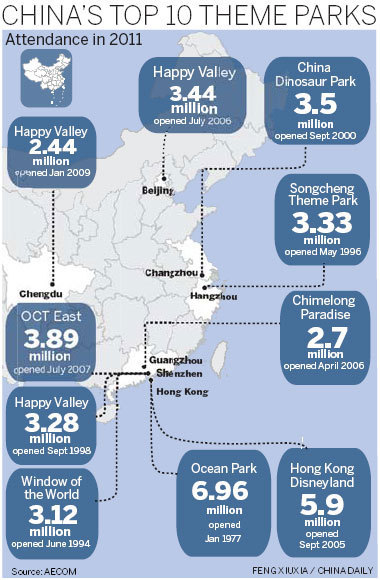
Nearby apartments, hotels prove profitable for project developers
When visiting a theme park in China, listen for the shrieks as the roller coasters whiz past and the bumper cars collide.
Chances are, the loudest such screams of joy are from the investors.
|
 |
Amusement parks are a booming business in China. But although attractions are springing up nationwide, industry insiders say the trend has less to do with tapping the thrill-seeker market and more to do with securing prime real estate.
Theme parks in Asia sold a combined 103.3 million tickets last year, one-third of the total in the world and second only to those sold in North America (127 million), according to AECOM, a consultancy firm in Hong Kong.
And unlike the US, East Asia is seeing a growing number of new attractions.
Chris Yoshii, an analyst for AECOM, told USA Today recently that almost a third of China's 2,500-plus theme parks have opened within the past two years, with the total number expected to surpass that of the US by 2020.
However, a 2010 study by the firm found that at least 70 percent of these attractions are actually losing money, with the real profits coming from adjacent projects.
Feng Yuguo, secretary-general of the China Association of Amusement Parks and Attractions, said that fact doesn't worry investors.
"Many investors don't mind losing money operating theme parks, since the sales of tickets and food make up only a very small percentage of their profits," Feng said.
"The major part comes from the adjacent commercial and residential developments, including apartments, villas and hotels."
Profit model
Victory Kingdom in Tianjin, which borders Beijing, has made 20 million yuan ($3.14 million) since opening its doors on July 7.
Yu Gui Garden Investment Group, a real estate developer from Guangdong province, invested 3 billion yuan in the project. Yet an insider who did not want to be identified said the villas and hotels now under construction nearby are expected to turn a bigger profit, and faster.
"Many foreign-funded enterprises have settled in the area in recent years, as it was made an economic and technological development zone in 1991," said Wang Zhen, the park's publicity officer.
The zone has led to 90 billion yuan being invested in the past two decades and an influx of 1,200 enterprises from 50 countries and regions, creating about 125,000 jobs.
"As transportation gets more convenient, we believe we will get more visitors in the future than the 150,000 we received in the first month," Wang said.
He added that the second phase of the park, which is twice the size of the part already open to the public, is scheduled to open next year.
As Victory Kingdom brings an influx of people ready to part with their hard-earned money, industry analyst Shao Gang predicted the zone will enjoy boom times over the next five years, with hotels, shopping malls and restaurants soon arriving to get a piece of the action.
"Many (developers) are trying the same model," the deputy director of EntGroup Consultants in Beijing said. "They buy land at a relatively low price to build a theme park and then erect adjoining apartments and hotels."
Unlike residential developments, the restrictions imposed by the State Council to cool the "hot" property market do not apply to projects classified as cultural or for entertainment purposes.
As this is the case, theme parks have become attractive investments to major real estate companies.


 Washington to remain focused on Asia-Pacific
Washington to remain focused on Asia-Pacific RQFII target blue chips amid bear market
RQFII target blue chips amid bear market Australian recall for top two exporters
Australian recall for top two exporters China fears new car restrictions
China fears new car restrictions